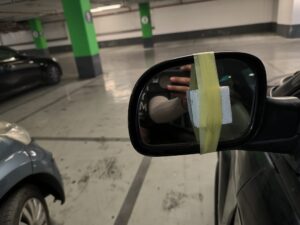Cars are expensive- to buy, to run, to fix. There are frugal ways to have a car, but many of these will depend on what type of car you purchased initially. I do not have a car, but have given this a lot of thought, because from time to time we do talk about the potential of getting a car. However, since I don’t have personal experience having a car, to make this post as useful as possible to as wide of an audience as possible, this post is a combination of my own ideas as well as suggestions my friends have given me when I told them I’d be writing this post.
Frugality Considerations When Purchasing a Car
Should I get a car or can I do without?
Before one even gets down to what a person should be looking for when purchasing a family car, it is a worthwhile question- do I really need a car? Can we get by without a car or with just one car?
I wrote a whole post on how I manage to live my life without a car not to tell people that they shouldn’t have a car, but to give an example of how some people manage without a car. It is doable in some places and some stages in life. In order to manage without a car you need to live in a place with a good public transportation system, among other lifestyle decisions.
Sometimes, though, you just need a car. Before deciding to purchase a car, calculate how often you need a car. Is it once or twice a month? Once a week? A few times a year for a week at a time? Calculate how much a car would cost you (purchase and maintenance, plus gas, insurance, and all the other fees) and compare that to how much it would cost to either rent a car for those specific times or take a taxi, or Uber, or Lyft, or other ride sharing options. Often once you compare the cost, it works out to be more frugal to pay for a car as needed instead of keeping one all the time.
However, if deciding to not have a car, consider how much you’re paying because you don’t have a car. Not only do you need to pay for public transportation, and the occasional car rentals, factor in your time and how much that is worth. If, because you are relying on public transportation or other ride shares, you end up being able to work fewer hours or take on fewer jobs, that may make it not worth it. For example, if your commute is too long and therefore the amount of hours you can work are limited, or because you are offered jobs in a few separate places and there isn’t time for you to get from one to the other in time, and much of your potential work time is spent traveling, then not having a car would cause you to lose money.
There are also some professions that require a car and perhaps you would be able to make a higher income by being able to work in that field (things like catering, repairman jobs, health care or other service professionals that involve home visits) if you had a car vs a job that you could do while relying on public transportation.
If you don’t have a car, will you end up spending much more money on groceries and other purchases, because it is too hard to go shopping in frugal places and to stock up on sales when using public transportation?
Lastly, when you have children, you may need to pay more for longer babysitting hours because of the extra time it takes you to get to various places, or you may need to pay more to arrange transportation for your child to school instead of driving them yourself.
Add it up- don’t assume it is cheaper with or without a car- compare it based on your life, factoring in all these details.
Getting a Car- New or Used?
Some people think it’s best to buy a brand new car, because they don’t want to “inherit someone else’s problems”. My dad says that its best to buy a one year old car if you can get one at a good price, because the biggest price depreciation occurs in the first year.
Any new car is mostly untested and also very expensive. The cost and value start to decrease immediately, while information about the car (such as known defects) rises over time. You want to buy a car when that bathtub curve has started to level out, which means you’ll get the most value for your money. There are several places to find car reviews and discover the best values, so do your research. Consumer Market is a great place to find this information out, and many find it worth joining online on a month-by-month basis while car searching.
Nearly every person who responded to my queries about frugality considerations when purchasing a a car suggested to not buy a new car because its value depreciates so much just the second you take it out of a lot. (A few disagreed.) Most talked about the sweet spot when purchasing a car used, that it having low mileage is important, that if your car has a high mileage, even if it ends up being significantly cheaper to purchase it, the amount it will cost in repairs regularly will generally outweigh the savings making it non worthwhile purchase. Getting a certified used car with low mileage seems to be the most common recommendation.
Tips When Buying Used:
Spend the extra money to have the car checked by a professional before you buy to make sure that you aren’t buying something problematic. I know too many people who spent money on a used car, only to have it die and be completely not worth fixing less than 2 weeks alter.
Compare prices online of the car you’re looking to buy.
When buying used there is more wiggle room available; try to bargain down the price.
Frugality Factors Involved in Purchasing
In some places, like where I live, gasoline tends to be very expensive. Fuel is a big factor, especially for people who need to drive a lot for their jobs. A close relative who drives a lot sold her car and bought a hybrid car; even buying it new (since the model she was looking at wasn’t available used) ended up working out cheaper in the long run than keeping her old less fuel efficient car because of how much she was driving and how much she saved per month on fuel costs.
You also want to research the safety features of various vehicles, make, model, and year, and what it tends to cost to maintain over time- not just fuel costs, but how often do parts generally need replacing, and how much do those parts tend to cost? In the USA, for example, maintaining a Honda is cheaper than maintaining a Volvo, because of what the parts cost. Unless you live in an area with extremely high gas prices or drive a lot, those costs could add up far faster than sacrificing a few miles per gallon.
Expected life of a car is also something to consider when purchasing a car, because the cost of a car over the span of its lifetime makes a big difference, and if its lifetime isn’t that long, it doesn’t really matter if it was cheap at the start.
Where I live, you need to get a test done on your car, usually yearly. At some point, someone wanted to sell us a car very cheaply, but it was very old. Because of its age, instead of having this test done once a year, it needed to be done at least twice a year, if not more. Once we factored in these costs, we realized that this cheap car was not so cheap after all, and decided to do without.
While newfangled cool cars are enticing, sometimes the newest technology that makes the car a dream to drive can make it a fortune to repair. Smaller simple to fix cars are better, without the newest technology. Stick shift cars break less, get more gas mileage, and last longer than automatic cars.
Some people that I know with larger families decide to trade in their smaller cars for a larger sized car to fit their entire family. However, this may not be the best or most frugal choice for some families. If one person takes the car to work every day, driving many miles at a time, having a larger, less fuel efficient car for all the times that they are driving alone is not typically worthwhile financially. For that reason, many people where I live choose to get a motorcycle or motor scooter or even an electric bicycle for their daily commutes and leave the larger car at home. Or they have an additional smaller and more fuel efficient car that they use for their work commutes.
Types of Cars
If you are like most families, then you are always looking for ways to save money. One great way to do this is by purchasing a 4×4 car. 4×4 cars offer many benefits that can help you save costs on a variety of items.
One of the biggest benefits of owning a four-wheel drive car is that it can help you save money on gasoline. Many of these cars are equipped with engines that are more fuel-efficient than traditional two-wheel drive vehicles. This means that you will be able to save money at the pump each time you fill up your tank.
Another way that owning a four-wheel drive car can save your family money is by reducing wear and tear on your vehicle. When driving in slippery conditions, two-wheel drive cars often slip and slide around. This can lead to increased damage to your car over time. Four-wheel drive cars offer better traction and stability, because of 4×4 wheels.
Other Thoughts To Consider
Insurance costs for cars can be prohibitive. Taking a defensive driving course can often lower the cost of insurance. Insurance is a must for any car owner, and it is a legal requirement. If you are found not to have insurance then you might be facing a hefty fine. If the worst was to happen and you were involved in an accident or collision then your insurance pays out for any damage done. Without this, you would be paying it out of your own pocket, and this could destroy you financially. If you do find yourself involved in a road traffic collison or accident then you may need to consult the help of a car accident lawyer. They will help you and give you advice where necesary to get you through this tough time in your life.
This is a tip from my sister, Violet. Before purchasing a car, save up money for a car, while at the same time seeing if you can swing the cost of a car financially, by putting aside the amount of money every month that a car would cost you, for at least 6 months. If you can manage that, then use that money to pay for your car and don’t pay interest on car loans, but if you couldn’t manage to set aside that money every month, you’ll know that having a car would be a bad financial decision for you, and you’ll hopefully come up with a better option that can work for your family.
Having a mechanic that you trust and have built up a relationship with is irreplaceable. They often have lower quotes than at the dealership, and can work with you, letting you know what needs to be done urgently and what can wait.
While it is tempting to trade a car in when you get tired of it, the better option is to get a good car that you like and is reliable and drive it until its no longer worth driving.
Bon Voyage and safe driving!
Do you have a car? What type and how many? What would you say are your monthly or annual car related costs? How did you decide what type of car to get, and how much was frugality a consideration there? What would you suggest be added to this list to help people be more financially wise when purchasing their cars?





